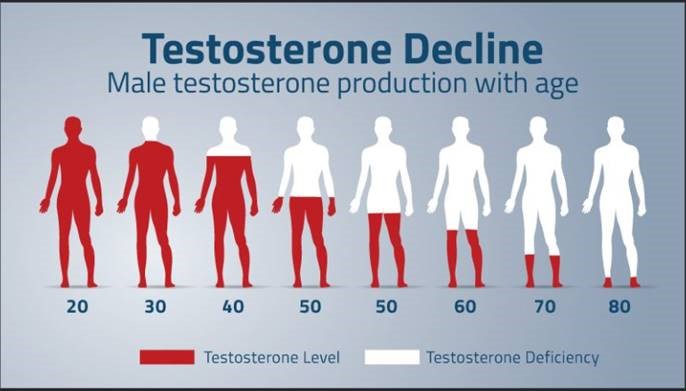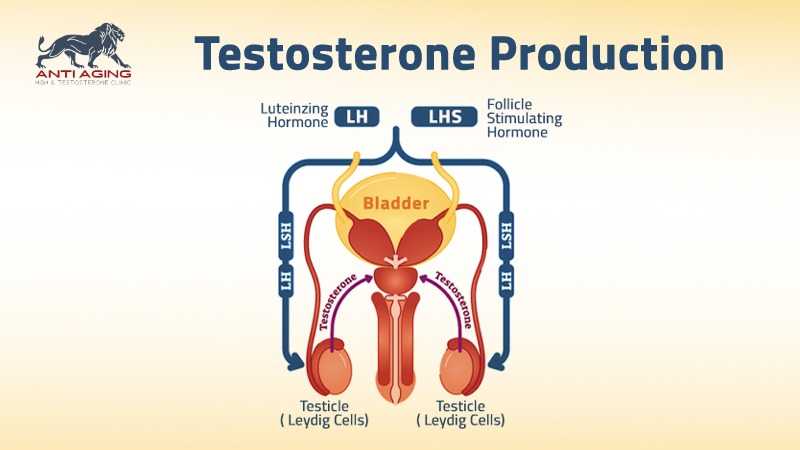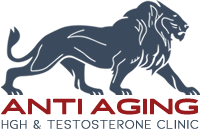
Testosterone Therapy
Testosterone therapy is a medical treatment that involves the administration of testosterone to treat low levels of this hormone in the body. Testosterone is a male sex hormone that is responsible for the development of male characteristics such as deep voice, facial hair, and muscle mass.
Testosterone therapy is typically prescribed to men who have low testosterone levels due to a medical condition such as hypogonadism, or as a result of aging. Symptoms of low testosterone can include fatigue, decreased libido, erectile dysfunction, muscle weakness, and depression.
Testosterone therapy can be administered in various forms, including injections, patches, gels, pellets, and oral tablets. The goal of testosterone therapy is to restore testosterone levels to normal, which can help alleviate symptoms and improve overall health and wellbeing.
- Candidates for Testosterone Therapy: Testosterone therapy is typically recommended for men who have a medical condition that affects their testosterone production, such as hypogonadism. It may also be recommended for older men who have lower testosterone levels due to aging.
- Benefits of Testosterone Therapy: Testosterone therapy can provide several benefits, such as increased muscle mass, improved bone density, and improved sex drive. It can also improve mood and cognitive function, and reduce the risk of developing certain health conditions such as diabetes and osteoporosis.
- Forms of Testosterone Therapy: Testosterone therapy is available in various forms, including injections, patches, gels, pellets, and oral tablets. The choice of form depends on the individual’s preference, lifestyle, and medical condition.
- Side Effects of Testosterone Therapy: Testosterone therapy can have side effects, such as acne, breast enlargement, sleep apnea, and an increased risk of blood clots and heart disease. It can also cause fluid retention and increase the risk of prostate cancer. However, the risk of side effects can be reduced with proper monitoring and management by a healthcare provider.
- Risks of Testosterone Therapy: Testosterone therapy is not recommended for men with a history of prostate or breast cancer, high red blood cell count, or a history of blood clots. It should also be avoided by women who are pregnant or breastfeeding. It is important to discuss the potential risks and benefits of testosterone therapy with a healthcare provider before starting treatment.
- Monitoring during Testosterone Therapy: Regular monitoring of testosterone levels and overall health is recommended while undergoing testosterone therapy. This includes blood tests to check for prostate-specific antigen (PSA) levels and red blood cell counts, as well as monitoring for any changes in mood, sleep, and sexual function.

Testosterone is a hormone produced by the testes in men and by the ovaries and adrenal glands in women. Testosterone levels naturally decline with age, beginning in the late 20s or early 30s. This decline in testosterone levels is called age-related hypogonadism or late-onset hypogonadism. The decline in testosterone levels can lead to several symptoms, such as:
- Decreased sex drive: Testosterone is responsible for sex drive in both men and women. As testosterone levels decline, there can be a decrease in sexual desire and performance.
- Erectile dysfunction: Testosterone helps stimulate the production of nitric oxide, which is responsible for relaxing the blood vessels in the penis and allowing blood to flow in. As testosterone levels decline, there can be a decrease in the ability to achieve and maintain an erection.
- Fatigue: Testosterone helps regulate energy levels in the body. As testosterone levels decline, there can be an increase in fatigue and a decrease in energy levels.
- Decreased muscle mass and strength: Testosterone is an anabolic hormone that helps build and maintain muscle mass and strength. As testosterone levels decline, there can be a decrease in muscle mass and strength.
- Decreased bone density: Testosterone helps maintain bone density in both men and women. As testosterone levels decline, there can be a decrease in bone density, which can increase the risk of fractures and osteoporosis.
- Changes in mood: Testosterone helps regulate mood in both men and women. As testosterone levels decline, there can be an increase in irritability, depression, and anxiety.
It’s important to note that not all men will experience a decline in testosterone levels or the same symptoms. If you are experiencing symptoms of testosterone decline, it’s important to speak with a healthcare provider to determine the cause and discuss potential treatment options.
What do growth hormone injections do?
Several glands in the body produce hormones, but health experts consider the pituitary to be the master control gland. Not only does it control other glands, but it also makes the hormone that triggers growth.
The pituitary gland is in the brain below the hypothalamus. It secretes hormones in response to chemical messages from the hypothalamus.
The human growth hormone (HGH) helps to influence height, as well as build bones and muscles in the body. It is crucial for processes involved in normal human growth and development.
Genetic factors can lead to a lack of growth hormone in children. Damage to the pituitary gland is a common cause of a deficiency in adults.
In this article, we look at the reasons to use HGH, the function of growth hormones, and possible side effects.

Testosterone production is regulated by a complex feedback loop that involves the hypothalamus, pituitary gland, and testes. Here is a brief overview of how testosterone is produced:
- The hypothalamus, a region in the brain, releases gonadotropin-releasing hormone (GnRH), which stimulates the pituitary gland.
- The pituitary gland, located at the base of the brain, releases luteinizing hormone (LH) and follicle-stimulating hormone (FSH) in response to GnRH.
- LH stimulates the Leydig cells in the testes to produce testosterone.
- Testosterone production is also regulated by negative feedback. As testosterone levels rise, they signal the hypothalamus and pituitary gland to decrease the release of GnRH, LH, and FSH, which in turn decreases testosterone production.
- In women, testosterone is produced in the ovaries and adrenal glands, but in much smaller amounts than in men.
Testosterone production is influenced by various factors such as age, genetics, nutrition, and lifestyle. Testosterone levels naturally decline with age, beginning in the late 20s or early 30s, but certain medical conditions, such as hypogonadism, can also lead to low testosterone levels. Additionally, lifestyle factors such as stress, lack of exercise, and poor nutrition can also affect testosterone production.
Testosterone Therapy: Why use human growth hormone?
HGH is essential to growth, especially in children, but it is also involved in many other processes in the body, including bone density, muscle mass, and mood.
Different hormones control various body functions and processes, including growth and development, metabolism, sexual function and reproduction, and mood.
It helps process protein and increases fat breakdown to help provide the energy needed for tissue growth.
Growth hormone levels can change through the day, and physical activity plays a part.
Exercise and similar activities can cause the levels to rise naturally. Sleep, stress, and low blood sugar levels also increase growth hormone levels.
Even small changes in HGH levels affect the body.
Too little or too much growth hormone can cause significant growth problems. Too little HGH is one of the main causes of short stature and conditions such as dwarfism.
Some people use HGH because they believe it will build muscle, improve performance, or slow aging. However, the existing evidence does not support the use of HGH for these purposes.
